So you want information about your child’s school; got $500?
Are public records truly public if the public can’t afford them?
That’s the question Waukesha School District parents are asking after filing a series of open records requests; they say the responses gave them sticker shock.
MILWAUKEE - Are public records truly public if the public can’t afford them?
That’s the question Waukesha School District parents are asking after filing a series of open records requests; they say the responses gave them sticker shock.
"The first thought that comes to your mind is, ‘That’s outrageous,’" David Wadd, whose daughter is a high school freshman in the district, said. "I mean this is public data, this is data about the performance of our children."
Open records advocates say the situation highlights long-standing issues with Wisconsin’s public records law; municipalities argue the charges are necessary.
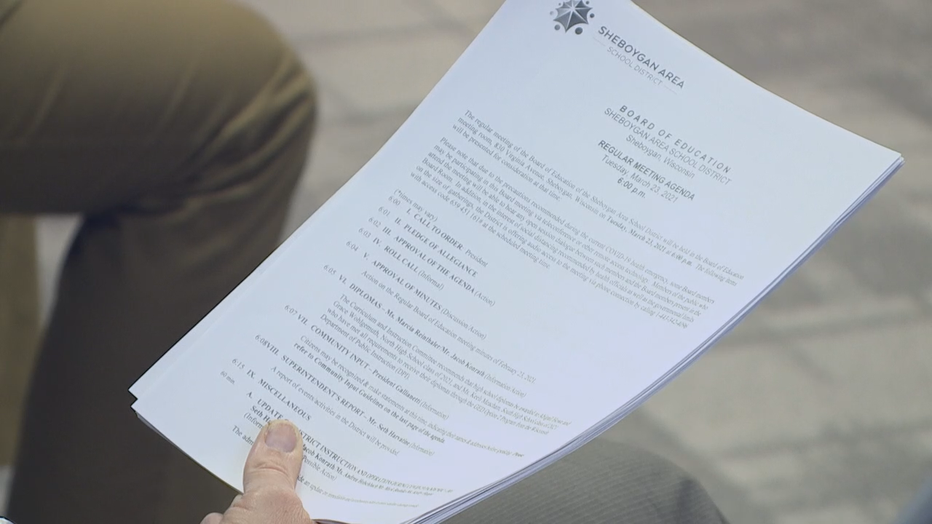
The request that started it all
In the fall, Waukesha parent Rebecca Flaherty filed an open records request with the district. She asked for a variety of student performance data, including hours of absences, percentage of students failing at least one class, percentage of students that have dropped out, average GPA, class drops, and quarantine information.
Other parents, like David Wadd and Stacy Keene, knew about the request and were eagerly awaiting the results.
"It was really sort of a result of watching my daughter increasingly struggle with grades, anxiety," Wadd said. "Why aren’t these things being discussed? Why aren’t we hearing about how kids are actually doing in the classroom?"
"No one seemed to be asking the question," Keene said. "So we asked the question."
"And then on Christmas Eve, a nice little present from the district, which was, ‘We have your data and it’s going to cost you $500 in order to get it,’" Wadd said.
The district’s response letter, dated December 8, said it would cost 16 hours to locate the data at $33.19 per hour, with a total cost of $531.04.
"I had no idea they could charge that sum of money," Wadd said. "I mean what parent can shell out $500 to get data about things that the district should know and should be able to tell you instantaneously when you ask?"
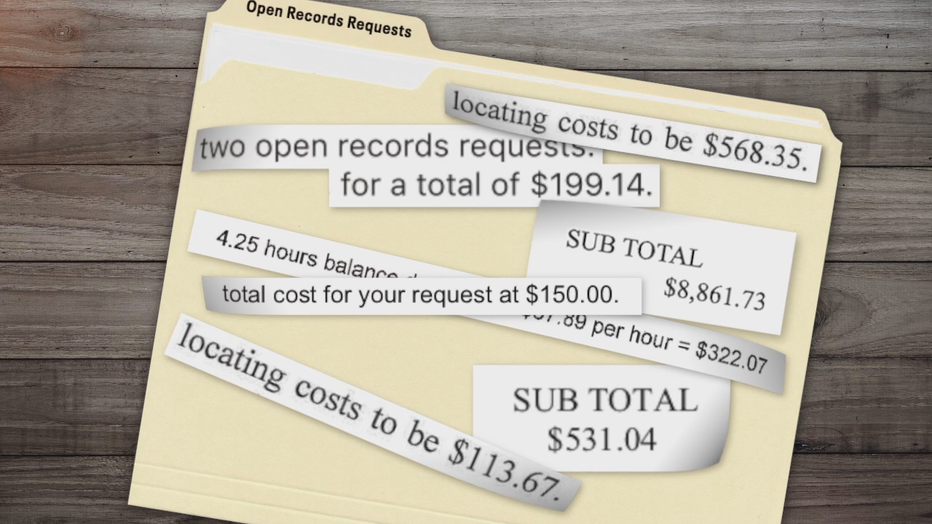
Location fees
Wisconsin law says the government can charge a requester for locating a record if the cost is $50 or more.
This charge does not include postage or paper copies; it is the cost of simply finding the record.
A review of the laws throughout the country reveals at least 30 states allow similar charges; some additional states allow a more limited collection of location fees, while at least 14 others do not allow for the charge.
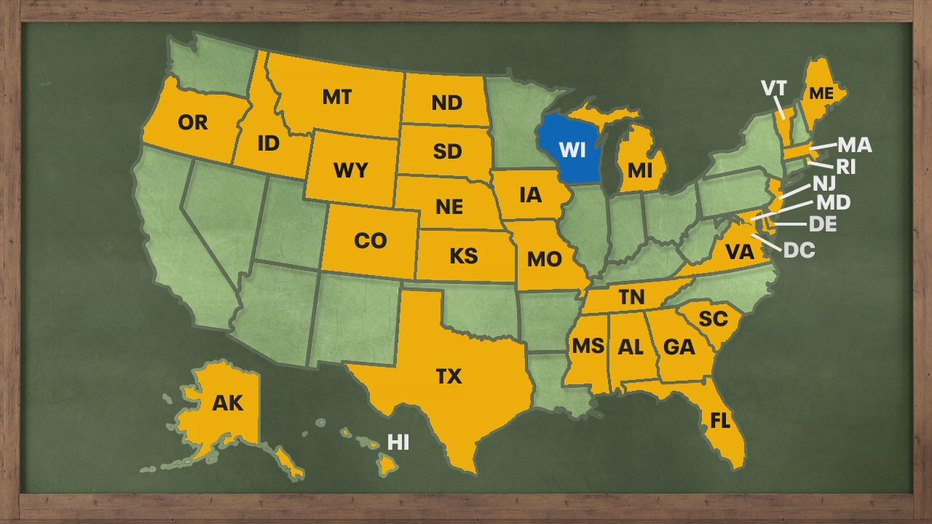
"Ideally, we wouldn’t have location fees," Pines Bach attorney Christa Westerberg said. Westerberg is also co-vice president of the Wisconsin Freedom of Information Council.
Wisconsin public agencies are permitted to require prepayment in many cases before requesters can receive the records.
"So you can have a situation where you have not seen one shred of paper, one record at all, before you’re required to pay these fees, which can reach into the hundreds of dollars," Westerberg said.
Over the years, the law has been interpreted to mean agencies can charge for salaried staff time to search for a record, so long as the lowest-paid employee possible is conducting the search. For example, if it takes an employee making $65,000 per year three hours to locate the records, the agency might send you a location fee estimate of $31.25 per hour, for a total cost of $93.75.
Some public agencies have even tried to include employee fringe benefits in their location fee calculations.
But Wisconsin Transparency Project attorney Tom Kamenick rejects the assumption that the government can use the law’s location fee provision to charge for salaried staff time and benefits to search for records. He points out the law says providing public records is part of government’s "routine duties," and public agencies are not supposed to profit off location fees.
"It wouldn’t cost the government any more money to fulfill this request because the person is drawing a salary, not being paid on an hourly basis," Kamenick said. "I think a lot of location fees really are just numbers pulled out of thin air in an attempt to hope the requester goes away."
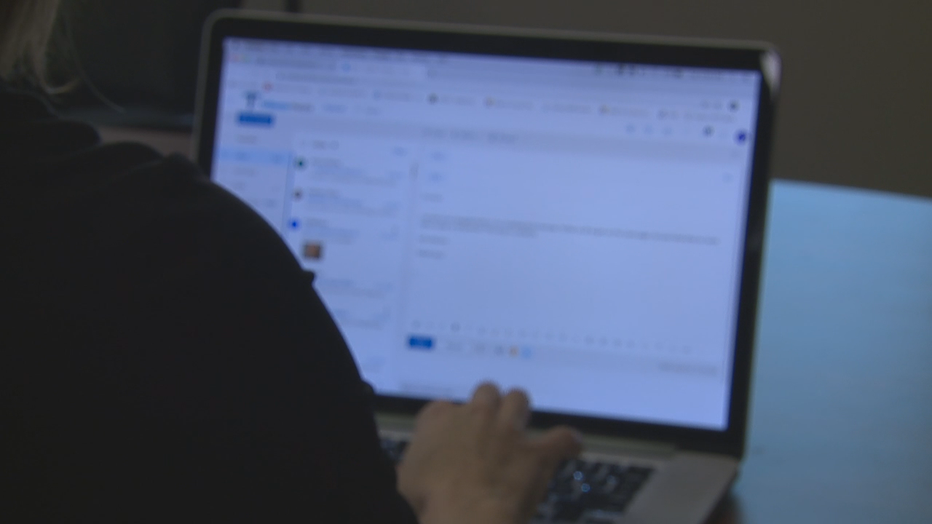
In November, Wisconsin Examiner reported on a Wauwatosa police email that suggested charging a "high price" to "combat the issue" of releasing public employee personnel files.
But other agencies have argued that locating public records takes time away from other staff responsibilities, and charging fees offsets the cost to other taxpayers for one person’s requests.
"We have had a significant number of [records requests,]" Waukesha superintendent Dr. Jim Sebert said. "And it’s taking us time, certainly, and resources….it was the way in which [this data] was requested and the way that we had to pull it differently for the request that caused the expense if you will."
"How could they have not been in a position where they could have instantly looked at a report of the quarter grades and know-how that measured up against the previous year?" parent David Wadd asked.
Sebert says the district was tracking the data, but not in the format in which parents requested it. Parents say no one gave them the option of providing the data in an already-existing format, free of charge.
"I’m generally skeptical of claims by records custodians that it’s going to cost a fortune for them to identify records in response to requests," Wisconsin Freedom of Information Council President Bill Lueders said. "I think most of the time, they’re over-interpreting the request, sometimes purposefully."
It’s not just Waukesha
In January, FOX6 filed open records requests for student performance data before and during the pandemic with the ten largest school districts in the region. The requests included records reflecting average student GPA, percentage of students failing one or more classes, percentage of students on track to graduate, attendance data, and dropout rates.
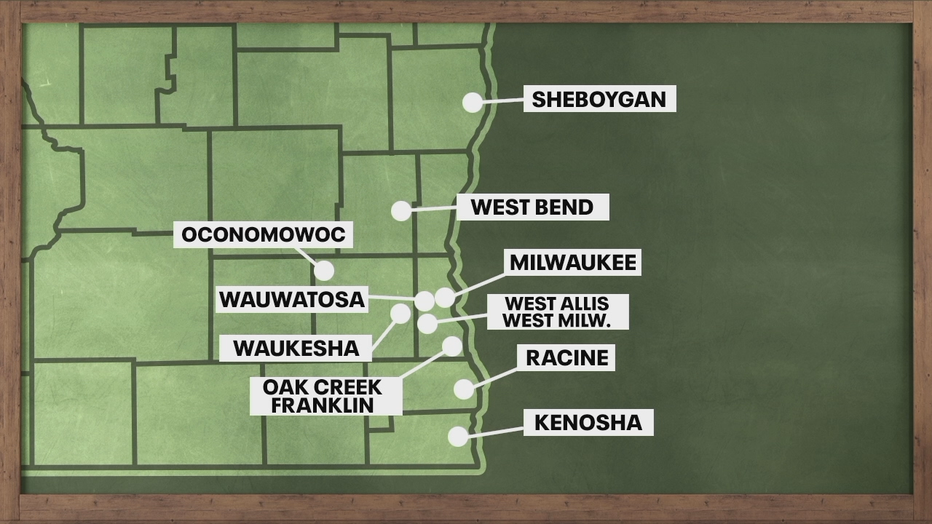
Kenosha Unified, Racine Unified, Sheboygan Area, West Allis-West Milwaukee and West Bend school districts provided the data quickly at no charge.
Milwaukee Public Schools and Oconomowoc Area School District offered the data at no charge, but did not provide it for several weeks. MPS documents say the data was compiled in February, but the district did not release it until April 1, the night before spring break. The district said it could not locate records reflecting historical GPA data or how many students are on track to graduate.
MPS did not respond to interview requests, so FOX6 asked the superintendent about the issue at a virtual press conference about reopening school buildings.
"Why is that number not right at your fingertips?" reporter Amanda St. Hilaire asked.
"In the next few days or so, we can be more in a place where we can more firm up numbers as we move forward," Dr. Keith Posley responded.
Oconomowoc Area School District took 55 days to release responsive data, which the superintendent had already presented to the school board.
"It’s because we had to put it all together for you in a way that we didn’t necessarily frankly have to," superintendent Dr. Roger Rindo said. "Because those data requests were pretty specific, so we had to take some things out so we could make it a bit more understandable for you."
Oak Creek-Franklin Joint School District, Waukesha School District, and Wauwatosa School District initially responded with fee estimates.
Oak Creek-Franklin’s superintendent said the data would take four hours to locate at $50 per hour. With the district waiving the first hour of the search, the total cost would be $150.
Waukesha said the data would take six hours to locate at $33.19 per hour, costing $199.14.
Wauwatosa estimated the requests would take a combined 18 hours to locate at $37.89 per hour, costing $682.02.
After several emails and phone calls, FOX6 narrowed the request to just average GPA and percentage of students failing one or more classes. Oak Creek-Franklin and and Waukesha ultimately did not charge.
Wauwatosa said the search for the narrowed request would still take two hours, costing $75.78. FOX6 pre-paid the amount and received the records.
The district then sent FOX6 a bill for an additional $322.07, claiming the search had actually taken 6.25 hours, even though superintendent Dr. Phil Ertl presented similar data at a public meeting weeks before.
When FOX6 questioned the cost, the school district stopped responding.
"That kind of sandbagging is a real problem in the law," Kamenick said.
"Whether or not you are asked to pay a location fee, it can affect you in that it affects the ability of requesters to get access to public information and to bring things to light," Lueders said.
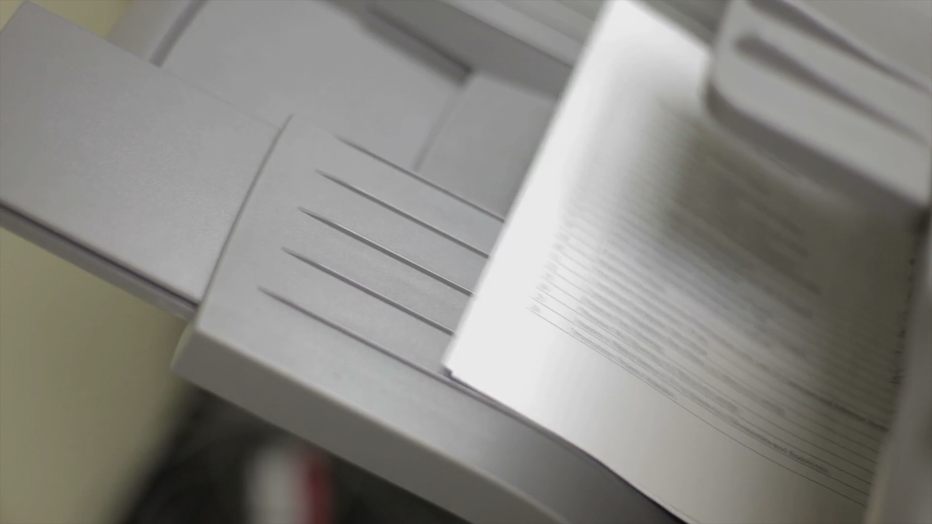
Proposed changes to Wisconsin Law
Lueders says Wisconsin lawmakers came up with the $50 threshold for charging location fees in the 80s; with inflation, that amount would translate to roughly $150 today.
Governor Tony Evers has proposed raising the threshold to $100. In other words, an agency could only start charging a requester for the location of records once the search hits $100.
Westerberg and Lueders call the proposal "promising," but acknowledge concerns that agencies could still inflate their search times and remain disincentivized to make records easier to find.
While Kamenick said he would prefer the elimination of location fees, he floated the idea of tying location fees to the time it takes for an agency to produce public records. An example would be only allowing the government to charge a location fee if it provides the records within ten business days.
States that do not permit public agencies to charge for staff time in the search for records have not seen government functions grind to a halt. A 2020 survey from Pennsylvania’s Office of Open Records found nearly 92 percent of agencies reported spending fewer than five hours per week responding to requests for public records; this includes 62.2 percent of agencies that reported spending less than one hour per week responding to requests.
Wisconsin’s Office of Open Government, which is part of the state Department of Justice, has not collected data on this scale from public agencies.
Getting the data
In Waukesha, word was circulating about the school district’s more-than-$500 charge for student performance records.
"It was actually quite amazing," David Wadd said. "People we didn’t even know immediately started offering to help offset the cost so that we could get our hands on the data."
"Parents were outraged," Keene said. "They donated money to help pay for this, and so it became this collective request from parents."
Keene says parents got the records in January, on the day the school board was scheduled to vote on whether to move to fully in-person learning.
"And our jaws dropped," Keene said. "It was worse than we ever imagined it could be."
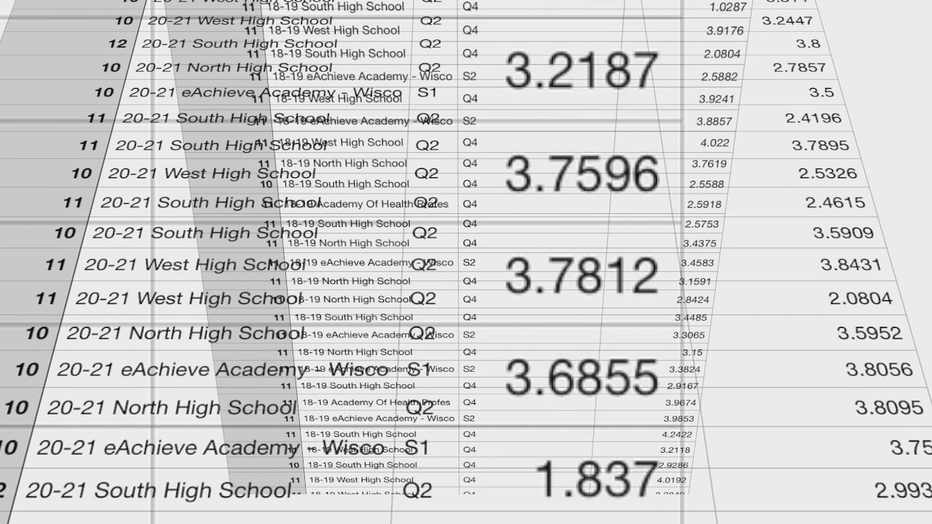
The records showed a decline in GPA between the first marking period of the 2019-2020 school year and the first marking period of the 2020-21 school year, which was largely hybrid learning; they also showed a jump in the percentage of students failing one or more classes.
Parents presented the numbers to school board members, some of whom said they had not seen the data.
"It took parents to find out that it was a complete disaster," Keene said.
"Generally speaking, in my experience as a superintendent, you don’t give out quarter grade updates to school boards," Dr. Sebert said. "Perhaps in a COVID environment like we were, and during these various models as we reflect on that, perhaps I could have...we’re all learning and we are all experiencing this for the first time."
That night, the board voted to move to fully in-person learning.
"We’ve discovered the power that exists in open records requests," Wadd said.
"They are advocating for their kids and advocating for what they want for their kids, which was getting them back in school, which we’re certainly proud that we’ve been able to do," Dr. Sebert said.
But parents say this is not a happy ending.
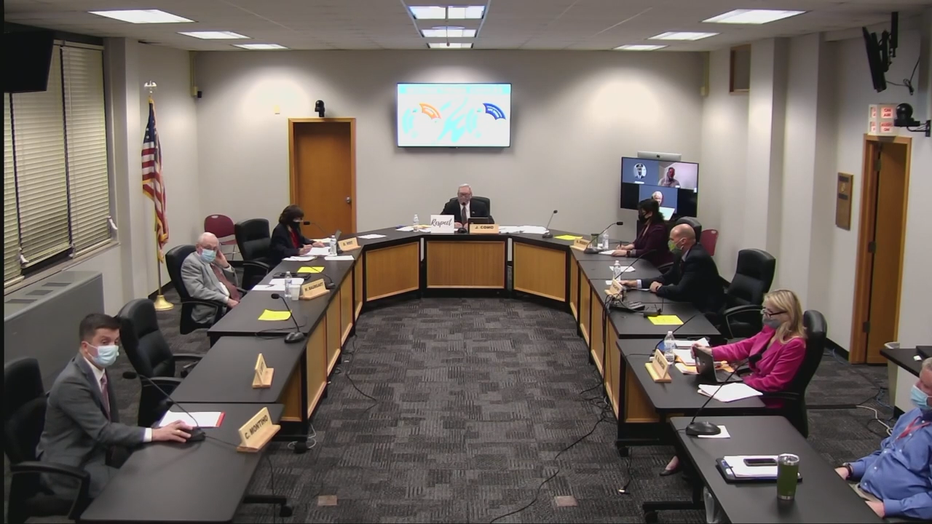
Several weeks later, a parent sent FOX6 a new location fee estimate from Waukesha School District in response to a request for employee disciplinary records, which are public under Wisconsin law. The request was initially sweeping, but the parenter narrowed it down multiple times in an attempt to lessen the location fee. Ultimately, the request was for "the disciplinary action(s) for any one employee completed between August 1, 2017 - December 31, 2017."
The district estimated even the narrowed request would take 267 hours to locate at $33.19 per hour; the total cost would be $8,861.73.
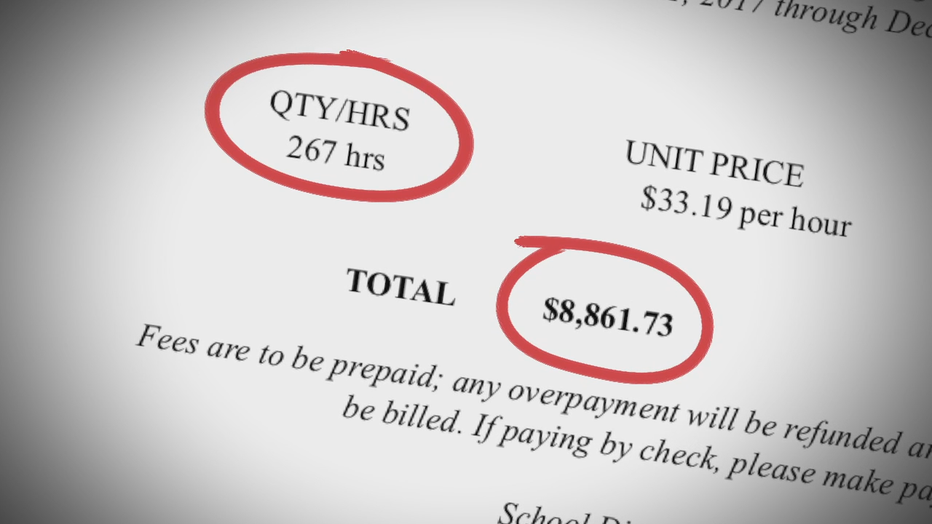
"Fees are to be prepaid; any overpayment will be refunded and any underpayment will be billed," the estimate said.
In an email to FOX6, Dr. Sebert said the district has made "significant efforts" to work with the requester.
"Since the District does not maintain a list of disciplinary actions, in order to complete the request, the District would need to review the personnel files and electronic records for each employee until it located a disciplinary action during that period of time in 2017," Dr. Sebert wrote. "Because the District has about 1600 employees, the location process for finding potentially responsive records for any one individual employee’s disciplinary actions in 2017 could be a time-consuming process."
"Additionally, because a District employee would have to search each personnel file to determine whether there was a disciplinary action from 2017 for an individual employee, the District would take on a significant burden of using that employee’s time to locate potentially responsive records," Dr. Sebert continued. "If the District had located a responsive record in significantly less time than expected, the requester would be reimbursed for any costs paid in excess of the actual time spent locating the record."
Dr. Sebert ended the email by writing, "While we sympathize with the cost burden in some situations, we have made great efforts to assist this requester to avoid or minimize the costs. At the same time, our citizens have an interest in having measures in place which balance the interests in efficiency of government and the primary educational mission of the District. These procedures are consistent with Wisconsin’s Public Records Law and its interpretation by the Attorney General."
"Maybe they should keep the records in better order so it’s easier to find things when somebody asks for it," Lueders said, speaking generally about public agencies who keep records in a manner that makes searches difficult. He noted the ability to charge location fees does not give public agencies much incentive to streamline their record keeping.
"It’s not on behalf of one person that a records response is being provided," Schott, Bublitz, & Engel attorney April Barker, who specializes in public records law, said. "It’s a public interest that that information be shared."
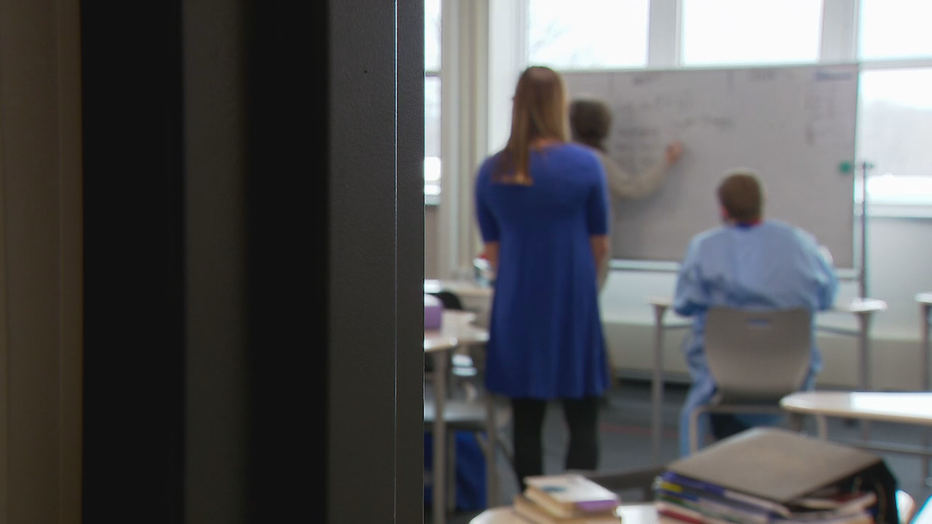
Advice from the experts
Barker, Kamenick, Lueders, and Westerberg say there are steps requesters can take if they receive a high location fee estimate.
Ask the public agency for a detailed breakdown of the cost so you can ensure the lowest-paid employee capable of locating the records is the person conducting the search and that the agency is not loading up the fee with payroll tax and fringe benefits.
Speak to the records custodian to get more details about what is involved in the fee and the search; this can allow you to narrow the records request, identify whether the records are available in a different and more affordable format, or break the request up into more affordable chunks. However, you do not need to identify yourself during these communications because the law protects your ability to request records anonymously.
Ensure the agency is not charging for redactions, which are not permitted fees in Wisconsin
Ask the records custodian to waive the fee if the records are in the public interest. Public agencies are not required to charge location fees, and have the discretion to waive them.
In the initial request, identify the amount you are willing to pay upfront so you do not get surprised with a large bill. For example, "Please notify me if the cost of this request will exceed $25."
"People should be skeptical and they should not give up," Kamenick said.
FOX6 investigates "Learning Loss"
- Part 1: Public records show students struggling across SE Wisconsin
- Part 2: Students are struggling: Here is what WI schools are doing about it
- Part 3: ‘Stranded:’ Honest conversation with WI students about mental health
- Part 4: Wisconsin schools look to continue, expand future virtual options

